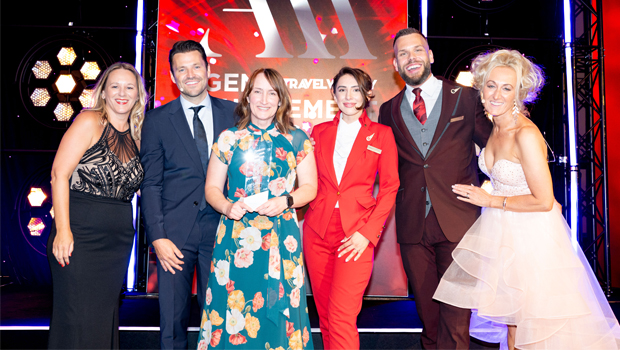Your Stories: AAAs winner Julie Cloe on the importance of training and mental health support
Dawson & Sanderson’s training and development general manager Julie Cloe talks about her role and winning an Agent Achievement Award earlier this year. Juliet Dennis reports

Dawson & Sanderson’s training and development general manager Julie Cloe talks about her role and winning an Agent Achievement Award earlier this year. Juliet Dennis reports.
Q. Tell us about winning the Agency Support Team Member of the Year award at Travel Weekly’s AAAs
A. My managing director nominated me. It was so nice that someone recognised what I do. I love being involved with training and development. It’s a really rewarding role. I’ve put the award alongside the other company awards, outside our MD Annelene Hutton’s office. For the company, it means a lot; it’s so nice to see the Dawson & Sanderson name out there. We’ve not put our name forward much for awards. With our apprentices, it will be key we push them towards things like this.
I left school and came straight into travel, working for AT Mays as the equivalent of a sales apprentice
Q. You’ve worked in travel for more than 20 years. What’s your background?
A. I started off as an apprentice on what was the Youth Training Scheme (YTS) at 16. I left school and came straight into travel, working for AT Mays as the equivalent of a sales apprentice. I worked in the Metrocentre branch in Gateshead. Then I went to Thomas Cook for seven years and after that moved to Dawson & Sanderson in Gateshead as a travel consultant. I was promoted to branch manager and worked at the Hexham branch for six or seven years, then moved to the Morpeth branch. Both branches were in Northumberland and were affluent areas, with interesting enquiries. I loved it. When I was offered a position at head office eight years ago, I took that as my next step, and I’ve never looked back. I was brought into head office as general manager for IT and training. My main focus now is training and development.
I get staff asking to do training. It’s really important. It helps with confidence and helps you keep up to date in your role
Q. Why is training so important?
A. Personally, it’s helped me to progress up the ladder. I’m always looking to progress myself and I have teaching as a side qualification. I get staff asking to do training. It’s really important. It helps with confidence and helps you keep up to date in your role. There are lots of online courses from suppliers that we encourage staff to get involved in.
Q. What about apprenticeships?
A.There are a lot of companies struggling to recruit and find people with experience; that’s where apprenticeships are key. Our company started taking on apprentices in 2011. You can mould them to how you want them to be. You look after them and nurture them after their apprenticeships so they stay. We have got apprentices and ex-apprentices from 2011 who still work for us. I encourage them to become mentors to new apprentices.
Our company started taking on apprentices in 2011. You can mould them to how you want them to be
Q. What about mental health in the workplace?
A. It’s key we have staff who are able to check on employees’ welfare. You have to look out for these staff. We also have young people coming into the business; some are just 16 and it can be overwhelming. The one thing I’ve really pushed for, and been overwhelmed by the response for, is mental health first‑aid training. I’ve done a Level 2 course myself and found it very informative. I’ve had interest from over 50 staff to do this and am currently focused on getting them on a qualification before January. There are free government-funded courses available. We need to educate more people in relation to mental health. I’d love to get some company ambassadors; people that staff can speak to.
The one thing I’ve really pushed for, and been overwhelmed by the response for, is mental health first‑aid training
Q. How important is it firms offer a career path?
A. Gone are the days of one job for life; the younger generation want career progression and we encourage that. We are fortunate because we’ve enough branches and teams [to offer progression]. We have 20 branches and over 200 staff. As with any workplace there are a lot of new staff coming in and a lot are new to travel. We are also looking at management training.
Q. Do you think the industry has lost its appeal to new recruits?
A. I think there is still interest there [in joining the sector]. This year we have seen a lot of fam trip invitations for staff: it’s getting back to the industry of old. That’s why people join – for the nice side of dealing with customers and the perks.
This year we have seen a lot of fam trip invitations for staff: it’s getting back to the industry of old

Dawson & Sanderson has just taken on eight apprentices. What’s the process?
This is our first group intake since 2018. We were inundated when we advertised. We don’t look to put apprentices where we need staff. We tend to put them in branches where we have a full team already, so they are an addition to the team and can be nurtured and helped to develop. We find this works. We are conscious some apprentices are coming straight from school at 16. If you throw them in at the deep end, it doesn’t work; it terrifies them. I’m the main contact for apprentices outside their actual team. Some grasp the job quicker than others. We treat them all as individuals and they don’t have to do something by a certain date. I’m currently in the process of doing catch‑up visits to check they are all settled. They do one day of training a month either via Teams, or a trainer comes to them as a group. There are other sessions where we bring suppliers in to do sessions via Teams. I have an in-house training plan, but the vast majority is about learning on the job.

 ValVades
ValVades 































